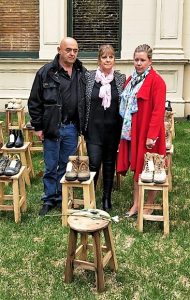 On June 5 2018, Sharon O’Keeffe of the North Queensland Register newspaper aired the response of the Deputy Commissioner of the Australian Competition and Consumer Commission (ACCC) Mick Keogh to claims from the Federated Chamber of Automotive Industries (FCAI) on the safety of quad bikes and crush protection devices (CPDs). O’Keeffe says “the gloves are off”.
On June 5 2018, Sharon O’Keeffe of the North Queensland Register newspaper aired the response of the Deputy Commissioner of the Australian Competition and Consumer Commission (ACCC) Mick Keogh to claims from the Federated Chamber of Automotive Industries (FCAI) on the safety of quad bikes and crush protection devices (CPDs). O’Keeffe says “the gloves are off”.
In March 2018, the ACCC announced its intention for a mandatory safety standard for quad bikes, or All Terrain Vehicles (ATV,) that included CPDs.

 With little surprise, at the Australian Labor Party (ALP) Conference in Victoria on 26 May 2018, Premier
With little surprise, at the Australian Labor Party (ALP) Conference in Victoria on 26 May 2018, Premier  The primary occupational health and safety (OHS) duty rests with employers or, as they are known in most Australian jurisdictions, Persons Conducting a Business or Undertaking (PCBU). Laws are based on an assumption that employers are aware of this duty and that this duty, to provide a safe and healthy work environment without risks to health, reflects the employer’s social position and social responsibility or the company’s “
The primary occupational health and safety (OHS) duty rests with employers or, as they are known in most Australian jurisdictions, Persons Conducting a Business or Undertaking (PCBU). Laws are based on an assumption that employers are aware of this duty and that this duty, to provide a safe and healthy work environment without risks to health, reflects the employer’s social position and social responsibility or the company’s “ Excessive workplace stress in the medical profession is well documented but stress is often seen as a minor workplace hazard that is fairly easily dealt with by holidays, for instance, or is dismissed as an “occupational hazard” or part of the entry to the profession or just part of the culture, with the implication that nothing can change. Only recently have
Excessive workplace stress in the medical profession is well documented but stress is often seen as a minor workplace hazard that is fairly easily dealt with by holidays, for instance, or is dismissed as an “occupational hazard” or part of the entry to the profession or just part of the culture, with the implication that nothing can change. Only recently have 
